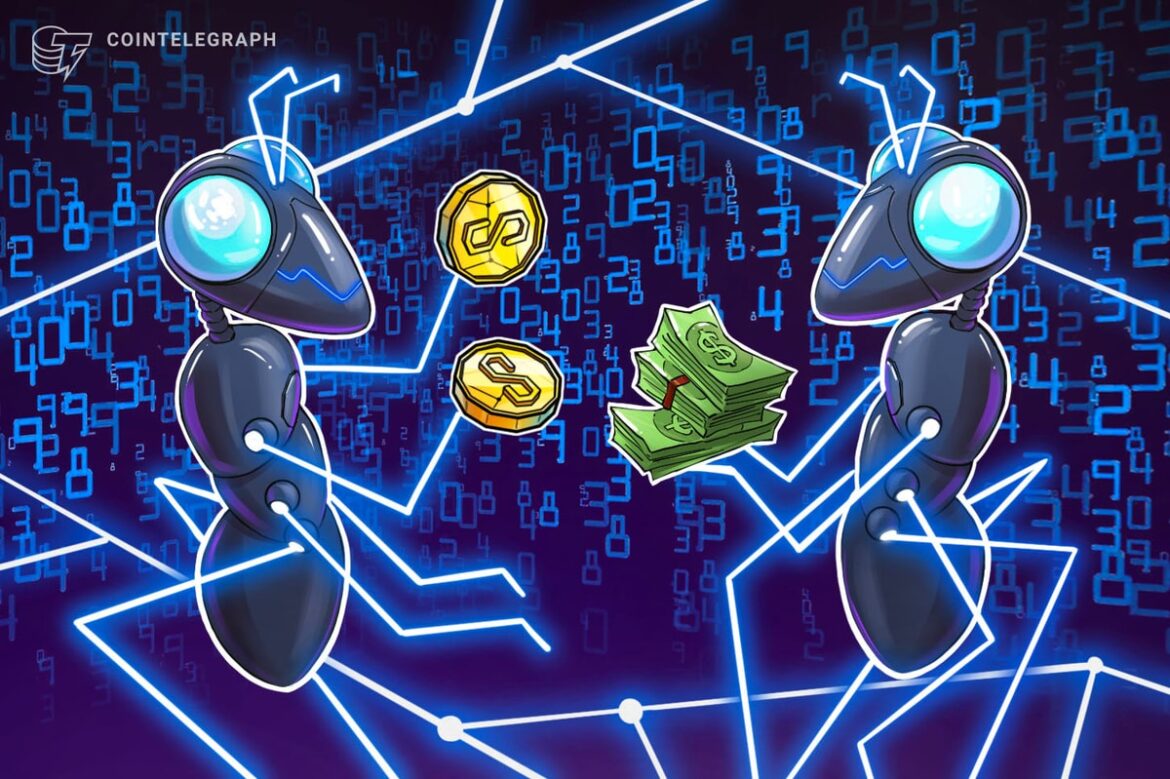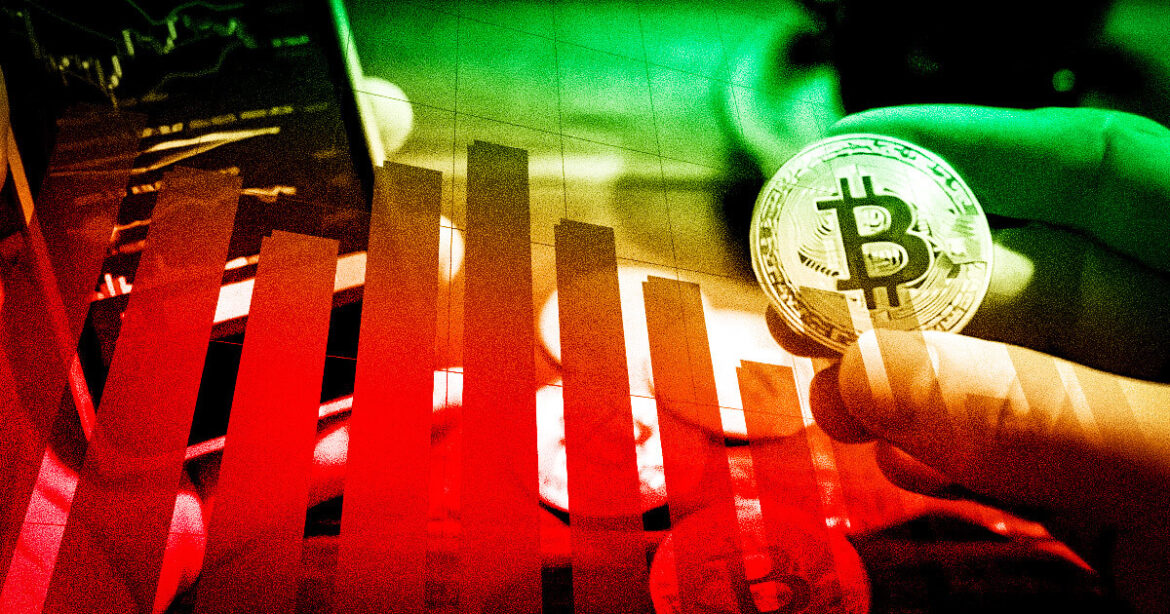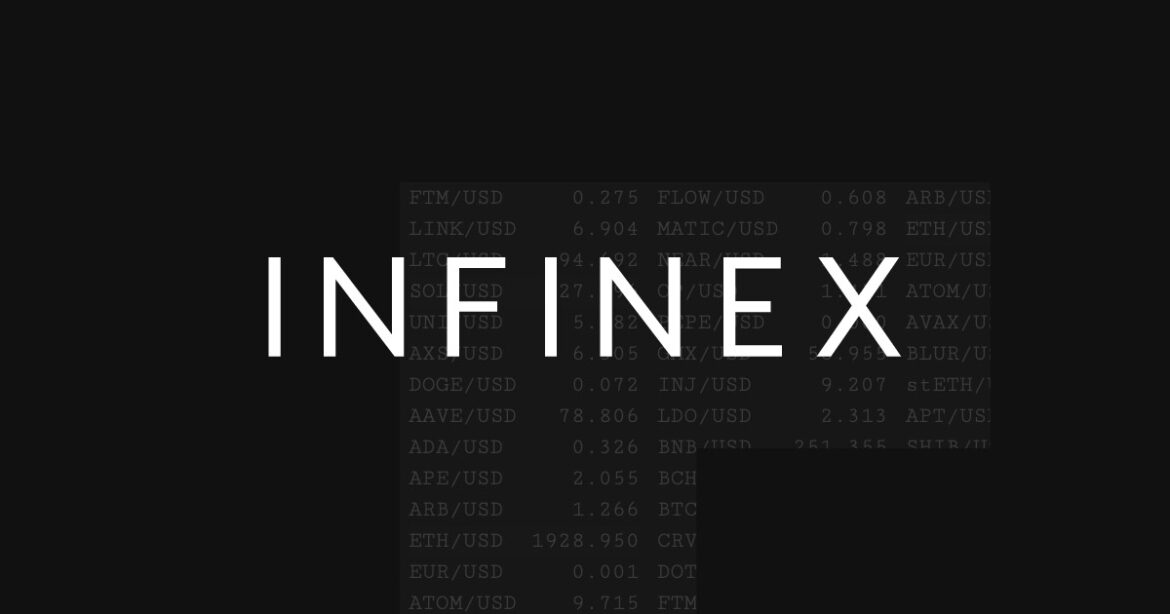 According to Ricardo Da Ros, CEO of the crypto platform Patex, many crypto users in Latin America (LATAM) seem to prefer using centralized exchanges (CEXs) over decentralized ones. He attributes this preference to a culture in the region that “has been built on trust in authority.” Da Ros suggests that this culture, combined with the […]
According to Ricardo Da Ros, CEO of the crypto platform Patex, many crypto users in Latin America (LATAM) seem to prefer using centralized exchanges (CEXs) over decentralized ones. He attributes this preference to a culture in the region that “has been built on trust in authority.” Da Ros suggests that this culture, combined with the […]
Source link
centralized
March Sees Nearly $1 Billion In Ethereum Netflow To Centralized Exchanges
The price of Ethereum has not exactly lived up to its promise as the month has gone on, despite a stellar start to the month. While this bearish pressure has been widespread in the general cryptocurrency market, regulation uncertainty has been an additional concern for ETH, igniting a negative sentiment around the “king of altcoins.”
Interestingly, the latest on-chain revelation shows a substantial amount of Ethereum has made its way to exchanges so far in March, suggesting that investors might be losing confidence in the long-term promise of the cryptocurrency.
Are Investors Losing Confidence In Ethereum?
According to data from CryptoQuant, more than $913 million has been recorded in net ETH transfers to centralized exchanges so far in March. This on-chain information was revealed via a quicktake post on the data analytics platform.
This net fund movement represents the largest volume of Ethereum transferred to centralized exchanges in a single month since June 2022. Even though March is still a week from being over, this exchange inflow appears to be a complete deviation from the pattern observed over the past few months.

Chart showing total monthly netflow of ETH on centralized exchanges | Sources: CryptoQuant
As shown in the chart above, October 2023 was the last time cryptocurrency exchanges witnessed a positive net flow. It is worth noting that there was significant movement of Ethereum tokens out of the centralized platforms in subsequent months up until this month.
Meanwhile, a separate data point that supports the massive exodus of ETH to centralized exchanges has come to light. Popular crypto analyst Ali Martinez revealed on X nearly 420,000 Ethereum tokens (equivalent to $1.47 billion) have been transferred to cryptocurrency exchanges in the past three weeks.
The flow of large amounts of cryptocurrency to centralized exchanges is often considered a bearish sign, as it can be an indication that investors may be willing to sell their assets. Ultimately, this can put downward pressure on the cryptocurrency’s price.
Substantial fund movements to trading platforms could also represent a shift in investor sentiment. It could be a sign that investors are losing faith in a particular asset (ETH, in this case).
Moreover, the recent regulatory headwind surrounding Ethereum specifically accentuates this hypothesis. According to the latest report, the United States Securities and Exchange Commission is considering a probe to classify the ETH token as a security.
ETH Price
As of this writing, the Ethereum token is valued at $3,343, reflecting a 4% price decline over the past /4 hours. According to data from CoinGecko, ETH is down by 11% in the past week.
Ethereum loses the $3,400 level again on the daily timeframe | Source: ETHUSDT chart on TradingView
Featured image from Unsplash, chart from TradingView
Disclaimer: The article is provided for educational purposes only. It does not represent the opinions of NewsBTC on whether to buy, sell or hold any investments and naturally investing carries risks. You are advised to conduct your own research before making any investment decisions. Use information provided on this website entirely at your own risk.
What Bitcoin’s trading patterns on centralized exchanges tell us about the market

What is CryptoSlate Alpha?
A web3 membership designed to empower you with cutting-edge insights and knowledge. Learn more ›
Connected to Alpha
Welcome! 👋 You are connected to CryptoSlate Alpha. To manage your wallet connection, click the button below.
Oops…you must lock a minimum of 20,000 ACS
If you don’t have enough, buy ACS on the following exchanges:
Connect via Access Protocol
Access Protocol is a web3 monetization paywall. When users stake ACS, they can access paywalled content. Learn more ›
Disclaimer: By choosing to lock your ACS tokens with CryptoSlate, you accept and recognize that you will be bound by the terms and conditions of your third-party digital wallet provider, as well as any applicable terms and conditions of the Access Foundation. CryptoSlate shall have no responsibility or liability with regard to the provision, access, use, locking, security, integrity, value, or legal status of your ACS Tokens or your digital wallet, including any losses associated with your ACS tokens. It is solely your responsibility to assume the risks associated with locking your ACS tokens with CryptoSlate. For more information, visit our terms page.
Gensler calls Bitcoin ETFs ‘ironic’ due to their centralized nature, responds to Warren

SEC Chair Gary Gensler said it is ironic that people call the approval of spot Bitcoin ETFs a historical moment considering its centralized nature, which is the antithesis of Satoshi Nakamoto’s vision.
He said:
“Think about the irony of those who say this week is historic. This [the approval] was about centralization and traditional means of finance.”
Gensler made the statement during a CNBC “Squawk Box” interview on Jan. 12, where he delved into the reasons behind the SEC’s approval and addressed some of the concerns raised by Senator Elizabeth Warren.
Respecting the courts
Gensler said that the SEC approved the 11 spot Bitcoin ETFs due to the recent court decision in the regulator’s lawsuit against Grayscale. The court ruled that the SEC did not have legitimate grounds to reject a spot Bitcoin ETF since it had approved products based on futures for the flagship cryptocurrency.
Gensler said that the SEC has the utmost respect for the law and will always follow the court’s directives regarding regulation. He added that the approval of the ETFs does not equate to an endorsement of Bitcoin, and he continues to hold a critical stance toward the asset.
According to the SEC chair:
“Bitcoin itself we did not approve, we do not endorse. This is a product called an exchange-traded product that investors can invest in the underlying non-security commodity asset.”
He added that Bitcoin remains a “volatile store of value” that is not being used for any legitimate payments. However, he acknowledged that the underlying technology holds promise and that approving the ETFs was the “most sustainable path forward.”
Gensler also clarified that Bitcoin is the only cryptocurrency it considers a non-security commodity, likening it to gold and silver-based products. He added that the regulator continues to hold the view that the majority of crypto tokens are securities.
Response to Warren
Gensler’s remarks also touched upon Warren’s criticism of the decision. The senator has been a vocal critic of the cryptocurrency market, arguing that the SEC’s approval was legally and policy-wise erroneous.
Responding to these concerns, Gensler expressed respect differing opinions but reaffirmed his commitment to following legal and court directives. He stated:
“While I understand and respect the concerns raised by Senator Warren, our decision is grounded in a rigorous consideration of the legal framework and the current financial realities.”
Despite the controversy surrounding the SEC’s decision, the approval of these Bitcoin ETFs signifies a potentially new era for cryptocurrency in the mainstream financial market.
The inaugural trading session following the approval witnessed significant activity, indicating strong investor interest and potentially paving the way for more widespread acceptance of digital assets.

What is CryptoSlate Alpha?
A web3 membership designed to empower you with cutting-edge insights and knowledge. Learn more ›
Connected to Alpha
Welcome! 👋 You are connected to CryptoSlate Alpha. To manage your wallet connection, click the button below.
Oops…you must lock a minimum of 20,000 ACS
If you don’t have enough, buy ACS on the following exchanges:
Connect via Access Protocol
Access Protocol is a web3 monetization paywall. When users stake ACS, they can access paywalled content. Learn more ›
Disclaimer: By choosing to lock your ACS tokens with CryptoSlate, you accept and recognize that you will be bound by the terms and conditions of your third-party digital wallet provider, as well as any applicable terms and conditions of the Access Foundation. CryptoSlate shall have no responsibility or liability with regard to the provision, access, use, locking, security, integrity, value, or legal status of your ACS Tokens or your digital wallet, including any losses associated with your ACS tokens. It is solely your responsibility to assume the risks associated with locking your ACS tokens with CryptoSlate. For more information, visit our terms page.

In the rapidly evolving realm of DeFi, decentralized exchanges (DEXs) stand as a cornerstone, enabling seamless transactions in a trustless environment.
At the heart of these exchanges lies the mechanism of order matching, a crucial process that pairs buyers with sellers, facilitating the exchange of assets. Traditionally (on order book-based exchanges), order matching has been centralized, with a single entity overseeing the process to ensure efficiency and accuracy.
However, the advent of blockchain technology has paved the way for decentralized order-matching systems, promising to align DEXs with the ethos of decentralization further.
Centralized and decentralized order batchers are central to this discussion, each representing a different approach to order matching.
Understanding centralized order matching
Centralized order matching operates under the aegis of a central authority that oversees the matching of buy and sell orders. This setup collects orders within a defined time frame and batches them together. Once the batch is complete, a centralized matching engine sifts through the orders, pairing buyers with sellers based on predefined criteria such as price and time of order placement.
Advantages
- Efficiency: The centralized nature of batchers ensures a streamlined process, often resulting in faster order matching and execution. This is particularly beneficial in high-frequency trading environments where speed is of the essence.
- Accuracy: With a single entity overseeing the process, the likelihood of errors is significantly reduced, ensuring accurate order matching.
- Ease of management: Centralized systems often come with a well-defined administrative structure, making it easier to manage, monitor and rectify issues should they arise.
Disadvantages
- Centralization risk: The central authority becomes a single point of failure. In the event of a system breakdown or malicious activity, the integrity of the entire order-matching process is compromised.
- Privacy concerns: Centralized systems require participants to entrust their data to the central authority, which could deter privacy-conscious users.
- Lack of control: Traders have to relinquish control over the order-matching process, which could be at odds with the decentralized ethos that DEXs aim to uphold.
Centralized order matching through batchers presents a tried-and-tested mechanism, providing a level of efficiency and accuracy crucial for a seamless trading experience. However, the inherent centralization poses risks and challenges that may not align with the decentralization narrative prevailing in the DeFi space.
As DEXs evolve, the quest for alternative, decentralized order matching systems gathers pace, with smart order routers (SORs) emerging as a potential contender in this decentralized narrative.
Delving into decentralized order matching
Decentralized order matching, symbolized by smart order routers, embodies the essence of decentralization, where the process is distributed among participants within the network rather than being controlled by a singular entity.
In this setup, SORs autonomously match bids and ask order from the onchain order book and make profits on the spread
Advantages
- Decentralization: With no central authority, SORs epitomize the core ethos of decentralization, minimizing the risks associated with significant points of failure.
- Transparency: The decentralized nature of smart order routers ensures a higher degree of transparency as all transactions are recorded on the blockchain and visible to all participants.
- Self-Custody: Traders retain control over their orders, aligning with the tenets of user sovereignty central to DEXs.
Disadvantages
- Complexity: The decentralized setup can introduce a level of complexity that might be daunting for less tech-savvy individuals.
- Potential latency: Decentralized systems might experience a slight delay in order execution compared to their centralized counterparts, especially in networks with high congestion.
- Resource intensity: The continual search for optimal order routing across diverse liquidity pools can be resource-intensive.
Smart order routers highlight the potential of decentralization in order matching, aligning with the broader goals of transparency and user control within DEXs.
However, complexity and potential latency challenges underline the need for robust decentralized infrastructures to support seamless order execution.
Comparing options
The juxtaposition of centralized and decentralized order-matching systems through the lens of batchers and smart order routers unveils a spectrum of considerations.
On one end, the efficiency, accuracy and administrative ease offered by centralized systems like batchers is alluring, especially in a high-frequency trading landscape. However, the centralization risks and privacy concerns would be considered drawbacks to some.
Conversely, smart order routers pave the way for a decentralized order-matching paradigm, resonating with the core tenets of transparency and user control inherent in DEXs. Yet, the hurdles of complexity and potential latency cannot be overlooked.
Efficiency vs. decentralization: Batchers provide a streamlined and efficient process at the cost of centralization. Smart order routers, while decentralized, may introduce additional latency and complexity.
Security and transparency: The decentralized nature of SORs offers enhanced security and transparency, minimizing central points of failure, unlike centralized systems that may pose data privacy concerns.
User experience: Centralized systems may offer a more straightforward user experience, while decentralized systems offer user control but with added complexity.
Impact of blockchain technology: Blockchain technology is the linchpin that enables decentralized order matching, with smart contracts playing a pivotal role in automating and securing the process.
The discourse between centralized and decentralized order-matching systems symbolizes the broader dialogue within the DeFi space, encapsulating the trade-offs between efficiency, user control and decentralization.
As DEXs mature, exploring hybrid models that encapsulate the merits of both worlds might emerge as a pathway toward optimizing order matching in decentralized landscapes.
Conclusion
The discourse surrounding centralized and decentralized order matching, epitomized by batchers and smart order routers, underscores a pivotal juncture in the evolution of DEXs.
The trade-offs between efficiency, transparency, user control and complexity are emblematic of the broader challenges and opportunities within the DeFi space. As DEXs strive to balance the core ethos of decentralization with the pragmatic need for efficiency and user-friendly interfaces, exploring these order-matching systems becomes instrumental.
As DEXs evolve, hybrid models that encapsulate the merits of centralized and decentralized order-matching systems may emerge, potentially heralding a new era of optimized, user-centric and resilient decentralized trading platforms.
The information provided here is not investment, tax or financial advice. You should consult with a licensed professional for advice concerning your specific situation.
CSO at Genius Yield, a next-generation DEX & CEO at gomaestro.org a Web3 infrastructure provider
This article was published through Cointelegraph Innovation Circle, a vetted organization of senior executives and experts in the blockchain technology industry who are building the future through the power of connections, collaboration and thought leadership. Opinions expressed do not necessarily reflect those of Cointelegraph.
Learn more about Cointelegraph Innovation Circle and see if you qualify to join
Ripple CTO Addresses Bitcoin Adviser’s Claims That XRP Is Centralized
Ripple CTO David Schwartz has addressed claims made by El Salvador Advisor Max Keiser that the XRP token is a “centralized” cryptocurrency. Schwartz took to X (formerly Twitter) to clear the air, stating that the Bitcoin Adviser’s opinion of XRP was too ignorant to warrant a proper reciprocation.
Ripple CTO Criticizes Centralization Claims
On September 24, Co-founder of Volcano Energy and Bitcoin Advisor to El Salvador’s President, Max Keiser made a controversial statement about the XRP token. In an X (formerly Twitter) post, Keiser stated that Ripple’s native token, XRP was “centralized”, which was negatively received by the community and triggered a response from the Ripple CTO.
Responding to Keiser’s controversial claim about the XRP, Schwartz expressed his indignation and stated that he found the statement laughable.
“This is such an incredibly stupid argument I have no idea how I could possibly respond to it other than to laugh,” Schwartz said.
In addition to Schwartz, the Product Head of Visa Installment and former employee of Ripple, Josh Gierscha, also jumped on the bandwagon to debunk Keiser’s claims.
Initially, Giersch had believed that Keiser’s centralization claims were made from an X account impersonating the Bitcoin Advisor or from a fan account.
However, Schwartz revealed that the comment was made by the real Max Keiser. He responded by quoting the original post from Keiser’s real account.
Of course the real Max Keiser would never say anything this dumb.https://t.co/dd9JQUPvIYhttps://t.co/mOkN3v0vFU
— David “JoelKatz” Schwartz (@JoelKatz) September 27, 2023
Giersch then topped off the conversation, saying, “Keiser’s an industrial-grade crank, I shouldn’t have expected any better from him”
Keiser’s view on the XRP token was based on the cryptocurrency’s US patent created by Schwartz in 1992 which illustrated a cooperative system involving several interconnected computers.
This is not the first time that Keiser has said something to draw the ire of the XRP community. The Bitcoin advisor has had a poor view of the token for some time now and occasionally criticizes XRP while idolizing Bitcoin. Back in May, the Bitcoin advisor had come under fire following a statement labeling the XRP token a “shitcoin.”
XRP Twitter Community Reacts To Centralization Argument
The XRP community also poured out to criticize Keiser’s claims about the token. One community member attributed the statements to Bitcoin maxis being scared of the token’s abilities, saying; “Bitcoin maxis are terrified of XRP.”
Another X user jumped in to add their own two cents saying that Keiser was being intentionally misleading to his over 500,000 followers. Pointing to the patent which Keiser used as the basis for his statement, the user said “There’s no way he believes you filed a patent for the XRPL in 1988. Not a chance. Yet this is what he asserts. Seems he’s just an “ends justify the means” type of guy.”
Keiser’s remark on XRP’s decentralization contradicts the inherent nature of the token which is seen in its value as a digital payment currency and an open-source ledger blockchain.
Token price dragged below $0.5 | Source: XRPUSD on Tradingview.com
Featured image from VOI, chart from Tradingview.com
What is CryptoSlate Alpha?
A web3 membership designed to empower you with cutting-edge insights and knowledge. Learn more ›
Connected to Alpha
Welcome! 👋 You are connected to CryptoSlate Alpha. To manage your wallet connection, click the button below.
Oops…you must lock a minimum of 20,000 ACS
If you don’t have enough, buy ACS on the following exchanges:
Connect via Access Protocol
Access Protocol is a web3 monetization paywall. When users stake ACS, they can access paywalled content. Learn more ›
Disclaimer: By choosing to lock your ACS tokens with CryptoSlate, you accept and recognize that you will be bound by the terms and conditions of your third-party digital wallet provider, as well as any applicable terms and conditions of the Access Foundation. CryptoSlate shall have no responsibility or liability with regard to the provision, access, use, locking, security, integrity, value, or legal status of your ACS Tokens or your digital wallet, including any losses associated with your ACS tokens. It is solely your responsibility to assume the risks associated with locking your ACS tokens with CryptoSlate. For more information, visit our terms page.
Synthetix founder launches Infinex to compete with centralized exchanges

Infinex, a Synthetix frontend designed to rival centralized exchanges, was announced by its founder Kain Warwick on July 14.
Infinex serves as a frontend to the existing derivatives liquidity protocol Synthetix, which operates in part on Optimism’s OP Mainnet. The new Infinex interface will tackle three key obstacles: migrating users to Optimism, acquiring the sUSD stablecoin, and solving the need to sign every action.
Infinex aims to improve user experience
Infinex aims to streamline users’ DeFi experience while addressing prominent issues in the decentralized exchange (DEX) market. Warwick said that Infinex has a simple approach: “Nothing is sacred but the user experience.”
Warwick said that while many are optimistic about DEXs outperforming centralized exchanges, DEXs still face challenges in competing with centralized exchanges. Therefore, Infinex plans to replicate the centralized exchange experience instead of waiting for crypto UX improvements or for users to be concerned with counterparty risk.
Infinex will feature two interfaces: a simple mode for novice traders and a pro mode for experienced users. It will generate revenue through incremental trading fees, integration fees via the Synthetix Integrators program, and fees from SNX’s role as a liquidity provider (LP). All revenues will be used to accumulate additional SNX, boosting Infinex’s SNX LP position as Infinex trading volumes increase.
This platform also intends to show that Synthetix Perps can compete with centralized exchanges based on past accomplishments. Following developments in 2022, Synthetix launched Perpetual Futures in 2023 to mitigate key DEX friction points such as high slippage, low liquidity, steep fees, and market risk for Liquidity Providers (LPs).
In terms of governance, the Account Relayer—operated by Infinex Governance—will act like an L2 sequencer by processing all transactions and ensuring each one has been signed before execution. The platform will not launch a new token for this purpose: instead, Infinex will use the existing SNX token for governance.
Infinex has opened a waitlist for beta testing. Select traders with margin caps can use the platform on a first-come, first-served basis, and a referral program is also offered.
Infinex’s connection to Synthetix is noteworthy
Infinex was created by Kain Warwick, who is also the founder of Synthetix. Synthetix itself has recognized the new project by writing: “Let’s welcome Infinex, the newest perps integrator, to the Synthetix Ecosystem” on Twitter.
Sythenetix is the 21st largest DeFi platform by total locked value (TVL), with $531.4 million locked at present. The platform’s native cryptocurrency, SNX, is currently among the top 60 cryptos and reports a market cap of $754 million.
As such, the launch of Infinex provides a new way to access a moderately large decentralized exchange and could revitalize a notable DeFi platform.
Bankrupt Voyager experiences $250M withdrawal surge as users move assets to centralized exchanges
What is CryptoSlate Alpha?
A web3 membership designed to empower you with cutting-edge insights and knowledge. Learn more ›
Connected to Alpha
Welcome! 👋 You are connected to CryptoSlate Alpha. To manage your wallet connection, click the button below.
Oops…you must lock a minimum of 20,000 ACS
If you don’t have enough, buy ACS on the following exchanges:
Connect via Access Protocol
Access Protocol is a web3 monetization paywall. When users stake ACS, they can access paywalled content. Learn more ›
Disclaimer: By choosing to lock your ACS tokens with CryptoSlate, you accept and recognize that you will be bound by the terms and conditions of your third-party digital wallet provider, as well as any applicable terms and conditions of the Access Foundation. CryptoSlate shall have no responsibility or liability with regard to the provision, access, use, locking, security, integrity, value, or legal status of your ACS Tokens or your digital wallet, including any losses associated with your ACS tokens. It is solely your responsibility to assume the risks associated with locking your ACS tokens with CryptoSlate. For more information, visit our terms page.










